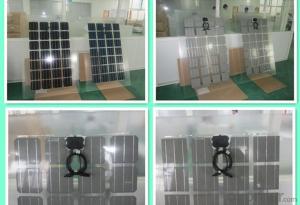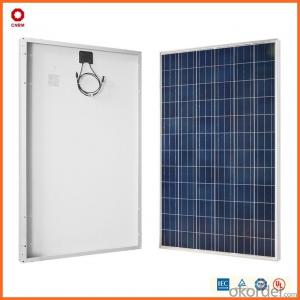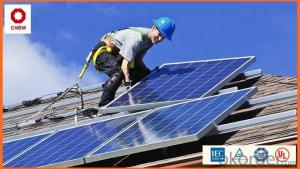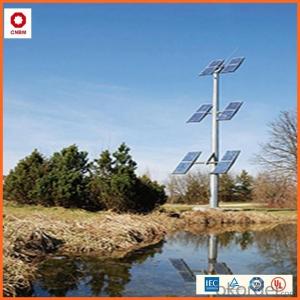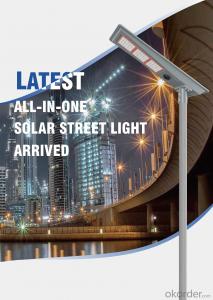60w Small Solar Panels in Stock China Manufacturer
- Loading Port:
- China main port
- Payment Terms:
- TT OR LC
- Min Order Qty:
- 1 watt
- Supply Capability:
- 10000000 watt/month
OKorder Service Pledge
OKorder Financial Service
You Might Also Like
Item specifice
Product Description:
Hot Sale !!! Quality and Safety of Small Poly Solar Panel 5w~150w
1. Rigorous quality control meets the highest international standards.
2. High-transmissivity low-iron tempered glass, strong aluminium frame.
3. Using UV-resistant silicon.
4. IS09001/14001/CE/TUV/UL
Warranties of Small Poly Solar Panel 35~85w
1. 10 years limited product warranty
2. 15 years at 90% of the minimal rated power output
3. 25 years at 80% of the minimal rated power output
Specification
Characteristics of Poly solar panels CNBM (245-320W) | |||||
Max Power Voltage Vmp(V) | 30.3 | 30.8 | 31.1 | 31.4 | 31.85 |
Max Power Current Imp(A) | 7.60 | 7.64 | 7.73 | 7.81 | 7.85 |
Open Circuit Voltage Voc(V) | 36.1 | 36.6 | 37 | 37.3 | 37.68 |
Short Circuit Current Isc(A) | 8.50 | 8.55 | 8.65 | 8.75 | 8.85 |
Max Power Pm(W) | 230W | 235W | 240W | 245W | 250W |
Temperature Coefficient of Cells Poly solar panels CNBM (245-320W) | |
NOCT | 45± 2 |
Temperature Coeffucients of Isc | 0.0492 |
Temperature Coeffucients of Voc | -0.3374 |
Temperature Coeffucients of Voc | -0.4677 |
Mechanical Data of Poly solar panels CNBM (245-320W) | |
Dimension | 1638 × 982 × 40 mm |
Weight | 19.5 kg |
No. of Cells and Connections | 60 (6 ×10) |
Tolerance | 0 ~ + 5 W |
Cell | Monocrystalline Cell 156 × 156 mm |
Packing | 624 Pcs/40ft(H) Container |
Limits of Poly solar panels CNBM (245-320W) | |
Operating Temperature | -40 to +85 |
Storage Temperature | -40 to +85 |
Max System Voltage | 1000VDC(IEC) / 600VDC(UL) |
Features of our products:
• High conversion efficiency mono/poly-crystalline amorphous silicon solar cells
• Modules incorporate high performance bypass diodes to minimize the power drop caused by shading
• High transmittance, low-iron tempered glass
• High performance EVA encapsulant to prevent destroying and water.
• AI frame: without screw, corner connection. 8 holes on the frame can be installed easily
• Good performance of preventing from atrocious weather such as wind and hails
• Certifications: CE IEC TUV VDE UL, Class I
• 10 years 90% power output warranty

Shipping of Small Poly Solar Panel 35~85w
By Sea | Delivery from Shanghai or Ningbo seaport |
By Air | Departure from Shanghai Pudong Airport |
By Express | Post by DHL, EMS, UPS, TNT. |
Features of our products:
• High conversion efficiency mono/poly-crystalline amorphous silicon solar cells
• Modules incorporate high performance bypass diodes to minimize the power drop caused by shading
• High transmittance, low-iron tempered glass
• High performance EVA encapsulant to prevent destroying and water.
• AI frame: without screw, corner connection. 8 holes on the frame can be installed easily
• Good performance of preventing from atrocious weather such as wind and hails
• Certifications: CE IEC TUV VDE UL, Class I
• 10 years 90% power output warranty
As a professional Solar Panel manufacturer and Supplier in China, we have our customers come around the whole world and our specialization has got a worldwide recognition. Meanwhile, with our superior quality, competitive price, prompt and excellent service, As main role in trade section of CNBM Group, CNBM International Corporation supplies products including Monocrystalline Solar Panel, Polycrystalline Solar Panel ( multicrystalline silicon Solar Panel) have received and enjoyed famous reputation in many countries and regions in the world.
- Q:Can solar energy systems be used in areas with limited access to education?
- Yes, solar energy systems can be used in areas with limited access to education. Solar energy systems are relatively simple and can be easily installed and maintained with basic training. Moreover, solar power does not require complex infrastructure or specialized skills to operate, making it accessible to communities with limited education. Additionally, the adoption of solar energy systems can contribute to the development of educational opportunities by providing electricity for schools and enabling access to online learning resources, thereby bridging the education gap in these areas.
- Q:Can solar panels be used in military operations or remote military outposts?
- Yes, solar panels can be used in military operations or remote military outposts. They provide a reliable and sustainable source of energy in remote locations where traditional power sources may be limited or unavailable. Solar panels can help power various equipment and infrastructure, including communication systems, lighting, surveillance equipment, and even charging stations for electronic devices. Their use in military operations can reduce dependence on fuel and logistical supply chains, making them a cost-effective and environmentally friendly solution.
- Q:Can a solar energy system be installed in a residential community with homeowners' association rules?
- Solar energy systems can indeed be installed in residential communities that have homeowners' association (HOA) rules. However, the regulations pertaining to solar panel installation can vary depending on the specific HOA. In certain cases, HOAs may impose restrictions on the type, size, or placement of solar panels. To proceed with the installation of a solar energy system in a residential community governed by HOA rules, homeowners would typically need to adhere to a set of guidelines or obtain approval from the HOA. This process may involve submitting an application, providing detailed plans and specifications of the system, and acquiring the necessary permits. Many HOAs have recognized the advantages of solar energy and have adopted supportive guidelines for solar panel installations. Some HOAs have even revised their rules to facilitate the installation of solar energy systems for homeowners. It is crucial for homeowners to carefully review the specific rules and guidelines of their HOA and establish communication with the association to fully comprehend the requirements and obtain the necessary approvals. In summary, while it is feasible to install a solar energy system in a residential community governed by HOA rules, it is vital to thoroughly examine the specific guidelines and secure approval from the HOA to ensure compliance and a seamless installation process.
- Q:How do I choose the right size of solar energy system for my home?
- Choosing the right size of a solar energy system for your home depends on several factors. First, consider your average electricity consumption, which can be determined by reviewing past utility bills. Then, assess the amount of sunlight your location receives throughout the year. Additionally, consider future changes in energy usage, such as adding new appliances or electric vehicles. Consulting with a solar energy professional can be helpful in determining the optimal size based on your specific needs and budget.
- Q:How does the quality of solar panels impact energy production?
- The quality of solar panels has a direct impact on energy production. High-quality solar panels are designed to efficiently convert sunlight into electricity, resulting in higher energy production. These panels are made with advanced technology and high-grade materials that maximize the absorption and conversion of solar energy. On the other hand, low-quality solar panels may have lower efficiency and durability. They may be made with cheaper materials and less advanced technology, leading to a lower energy production capacity. These panels may not be able to capture and convert as much sunlight into usable electricity, resulting in lower energy output. The quality of solar panels also affects their lifespan and reliability. High-quality panels are often built to withstand harsh weather conditions and have longer warranties, ensuring consistent energy production over many years. Low-quality panels may degrade faster and have shorter lifespans, leading to a decline in energy production over time. Therefore, investing in high-quality solar panels is crucial for maximizing energy production and ensuring long-term performance. Although they may be initially more expensive, the increased efficiency and durability of high-quality panels often result in higher energy savings and a faster return on investment.
- Q:Can a solar energy system increase the value of my home?
- Yes, a solar energy system can increase the value of your home. Studies have shown that homes with solar panels tend to sell for a higher price and have a faster selling time compared to homes without solar. This is because solar energy systems offer long-term cost savings on electricity bills and are seen as environmentally friendly, which appeals to homebuyers who are increasingly interested in sustainable and energy-efficient features. Additionally, some states offer incentives and tax credits for homeowners with solar, further adding to the financial benefits.
- Q:Can solar energy systems be used in powering concert halls or auditoriums?
- Yes, solar energy systems can certainly be used to power concert halls or auditoriums. The use of solar energy in large venues like concert halls and auditoriums has become increasingly popular due to its numerous benefits. Solar panels can be installed on the roof or surrounding areas of the venue to capture sunlight and convert it into electricity. This renewable energy source can then be used to power all the electrical equipment and lighting systems within the concert hall or auditorium. One of the main advantages of using solar energy systems in these venues is the potential cost savings. Concert halls and auditoriums often consume large amounts of electricity, particularly during events and performances. By harnessing solar power, these venues can significantly reduce their dependence on the traditional power grid and lower their energy bills. Additionally, solar energy systems require minimal maintenance once installed, which further contributes to the long-term cost-effectiveness. Moreover, integrating solar energy into concert halls and auditoriums aligns with the growing global focus on sustainability and reducing carbon footprints. By utilizing renewable energy sources like solar power, these venues can significantly decrease their greenhouse gas emissions and promote a more environmentally friendly approach to energy consumption. This not only benefits the venue itself but also contributes to the overall sustainability goals of the local community and society as a whole. However, it is important to consider that the size and power requirements of concert halls and auditoriums may require a significant investment in solar panels and associated equipment. The venue's energy demand, the available space for installation, and the local climate are all factors that need to be assessed during the planning stage. It is crucial to ensure that the solar energy system is properly sized to meet the energy needs of the venue and that it is designed to withstand the specific weather conditions of the location. In conclusion, solar energy systems can indeed be used to power concert halls or auditoriums. The benefits of using solar power in these venues include cost savings, environmental sustainability, and reducing reliance on the traditional power grid. With careful planning and installation, solar energy can provide a reliable and efficient source of electricity to meet the energy demands of such large-scale venues.
- Q:Can solar energy systems be used in areas with high levels of bird activity?
- Yes, solar energy systems can be used in areas with high levels of bird activity. However, it is important to take certain precautions to ensure the safety of the birds and the optimal functioning of the solar panels. One common concern is the potential for bird collisions with the panels. To mitigate this, manufacturers often incorporate bird deterrents such as mesh screens or reflective coatings on the panels to make them more visible to birds and reduce the risk of collisions. Additionally, proper installation and maintenance of the solar energy systems can help minimize potential nesting or roosting sites for birds, reducing the likelihood of damage to the panels. By addressing these considerations, solar energy systems can be effectively utilized in areas with high bird activity while still protecting the local avian population.
- Q:How do solar energy systems impact social equity?
- Solar energy systems have the potential to significantly impact social equity in various ways. Firstly, they provide access to clean and affordable energy for communities that may not have reliable access to electricity, reducing energy poverty and improving quality of life. Additionally, solar energy can create job opportunities, particularly in communities that have been historically marginalized or economically disadvantaged. This can contribute to reducing income inequality and empowering local economies. Furthermore, solar energy systems allow for decentralized power generation, giving communities more control over their energy sources and reducing dependence on centralized utilities. Overall, solar energy systems have the potential to promote social equity by improving energy access, fostering economic empowerment, and increasing community resilience.
- Q:Are solar energy systems expensive to install?
- While the upfront cost of installing a solar energy system can be relatively high, the long-term benefits outweigh the initial expenses. With advancements in technology and government incentives, the cost of solar panels has significantly decreased over the years. Additionally, solar systems have a long lifespan of 25-30 years, which means they provide a reliable and cost-effective source of renewable energy over time. In fact, the savings on electricity bills and potential incentives can result in a return on investment within a few years. Therefore, while the initial installation cost may seem expensive, solar energy systems are a wise investment in the long run.
1. Manufacturer Overview |
|
|---|---|
| Location | |
| Year Established | |
| Annual Output Value | |
| Main Markets | |
| Company Certifications | |
2. Manufacturer Certificates |
|
|---|---|
| a) Certification Name | |
| Range | |
| Reference | |
| Validity Period | |
3. Manufacturer Capability |
|
|---|---|
| a)Trade Capacity | |
| Nearest Port | |
| Export Percentage | |
| No.of Employees in Trade Department | |
| Language Spoken: | |
| b)Factory Information | |
| Factory Size: | |
| No. of Production Lines | |
| Contract Manufacturing | |
| Product Price Range | |
Send your message to us
60w Small Solar Panels in Stock China Manufacturer
- Loading Port:
- China main port
- Payment Terms:
- TT OR LC
- Min Order Qty:
- 1 watt
- Supply Capability:
- 10000000 watt/month
OKorder Service Pledge
OKorder Financial Service
Similar products
New products
Hot products
Hot Searches
Related keywords
